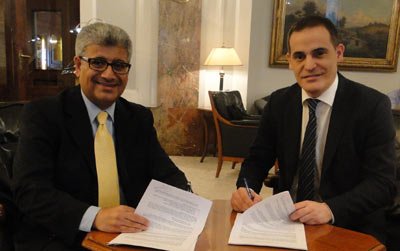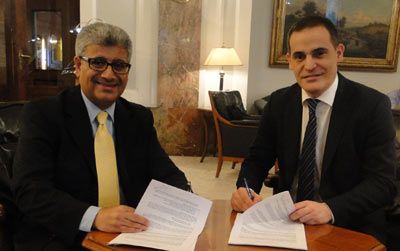COMO ARABIA ESTABLISHED TO PROVIDE LOGISTICS, SERVICES FOR MEGA PROJECTS
Published by Gbaf News
Posted on April 30, 2014
3 min readLast updated: January 22, 2026

Published by Gbaf News
Posted on April 30, 2014
3 min readLast updated: January 22, 2026

Saudi Qudurat Holding for Development and Spanish COMO company recently entered into a joint venture agreement to form a new company called “COMO Arabia” specialized in supplying logistics and operational services for mega projects such as, but not limited to, railway, water, energy and generation, mining and offshore platform projects even in remote areas, in addition to other infrastructure projects in the GCC countries.
Qudurat Holding owns 51% of the new company while Spanish COMO gets 49% ownership, a joint statement said. Headquartered in Riyadh, “COMO Arabia” targets projects in the GCC countries valued at SR500 million in the first three years of its operation.
The agreement was signed by Qudurat Holding CEO Eng. Ibrahim Al-Asseri and COMO’s CEO Alejandro Alvarez on the sidelines of Airline Catering Exhibition held in Hamburg, Germany.

Qudurat Holding CEO Eng. Ibrahim Al-Asseri (Left ) and COMO’s CEO Alejandro Alvarez (Right) during the signing of agreement
The joint statement also disclosed that the new company has won the logistics and operation of Al-Haramain Rail project in Makkah and Madinah – the first public means of transport with modern technology in Saudi Arabia. The SR6 billion ($1.5 billion) project awarded in 2009 is expected to partly go into operation by the start of next year.
Moreover, “COMO Arabia” aims to clinch the logistics and operation contract for the metro and public transport projects which the Kingdom had lately approved, in addition to opportunities available in the industrial complexes particularly in “Waad Al-Shamal” city which strategic projects were launched earlier this year.
COMO Arabia also anticipates participation in ambitious projects in the GCC countries especially in the UAE and Qatar as part of their preparations to host Expo 2020 and the 2022 World Cup, respectively.
Eng. Ibrahim Al-Asseri noted that Qudurat Holding is on the verge of a quantum leap in the type and size of its projects, especially in light of alliance with international companies that possesses the technical experience and financial capacity to achieve the aspirations of company’s shareholders.
“We’re really delighted to partner with COMO Spanish Company for the establishment of ‘COMO Arabia’. In its first phase, the new company will focus mainly on the GCC countries given the market enormity in the private sector, development of infrastructure projects and also in order to fulfill the local requirements. The company will later expand its scope of activities to cover the Middle East and North Africa countries,” Al-Asseri added.
COMO CEO Alejandro Alvarez expressed his happiness and gratitude to Qudurat Holding for selecting COMO to participate and contribute to the promising market in the Arab Gulf region. He confirmed that COMO had previously implemented major contracts in Europe, Asia and South America and that it currently seeks to geographically expand in order to start establishing successes in the Middle East and North Africa under the umbrella of “COMO Arabia” and with the effective participation of “Qudurat Holding.”
Explore more articles in the Top Stories category











